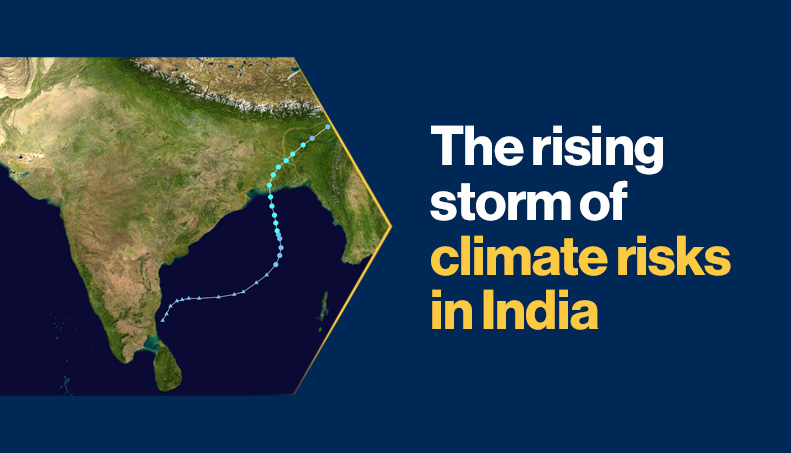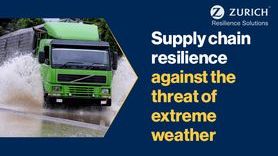The rising storm of climate risks in India

On 27th May, Cyclone Remal tore through the Bay of Bengal killing 50 people and forcing the evacuation of a million others across southern Bangladesh and eastern India.
This was the Bay of Bengal’s first tropical cyclone of the year and, according to news reports, it was so severe that flood protection embankments washed away, and millions were left without power after the network infrastructure experienced severe damage. As result of the storm’s 135kmph (84mph) winds, Kolkata airport closed, shipping was halted at Chittagong seaport, and schools closed as evacuees moved to over 9,000 cyclone shelters with assistance from India's National Disaster Response Force (NDRF).
Cyclones in Indian coastal zones are not a new phenomenon, but they have increased in number and magnitude in recent years[1], creating concerns for resilience professionals over escalating climate risks to the country.
Vaidyanathan Chandramouli, India’s BCI Chennai Chapter Leader, said:
“Climate risk is indeed a significant concern in India. Recent observations have shown irregularities in monsoon patterns, with some regions experiencing reduced rainfall with others facing excessive downpours. This inconsistency is marked by periods of heavy rain followed by abrupt stops, disrupting the usual monsoon cycle. Additionally, there is a noticeable rise in maximum temperatures across the country. Traditionally cooler regions are warming, and winters are becoming more severe”.
He adds:
“The primary concern posed by climate-related events in our region is the threat to supply chains and loss of premises. Rising sea levels and extreme weather events can disrupt operations, damage infrastructure, and create significant logistical challenges. Additionally, the warming of cooler regions leads to increased use of air conditioning, which contributes to global warming, while the intensification of winters necessitates heating equipment, creating a vicious cycle in the long run.”
Vaidyanathan reported that business continuity and resilience practitioners in India are exploring how to diversify and decentralise operations to better manage risks and adapt infrastructure to withstand extreme weather. Another avenue is exploring enhanced early warning systems to support timely evacuation and asset protection. However, support from top management is crucial in addressing these concerns effectively, as it is only with adequate support that organizations can implement the necessary measures to build climate resilience and ensure long-term preparedness. This is a change from traditional business continuity management that deals with the effects of disruption in order get back on track with critical activities into a more proactive approach of strategic thinking that modifies organizational structures and adapts infrastructure in advance.
However, Vaidyanathan added:
“Currently, there is limited understanding of these concerns, especially in countries like India, where small and medium enterprises (SMEs) significantly contribute to the economy. Their primary focus tends to be business sustainability rather than climate sustainability.”
The BCI Climate Risk Report 2023 underlines Vaidyanathan’s response. Survey respondents from around the world said that threats related to climate-related events are on the rise. Indeed, 44.4% of respondents stated they had seen a moderate or significant impact from climate related events over the past five years with rainfall and flooding topping the list as their primary climate-related concern. Extreme heat/heatwaves, hurricanes and tornadoes, and wildfires also posed risks, as did the new and rising concern of water scarcity.
As a result of increasing climate threats, 47% of respondents highlighted supply chain interruption as their primary concern. Staff absenteeism, loss of premises and power, and revenue dips are also significant potential threats. However, despite these wide-ranging outcomes and the notable rise in events, 22.1% of respondents report their organization has yet to consider climate risk on their risk agenda.
To face the rising tide of climate threats, practitioners should seek to align business continuity plans to environmental, social, and governance (ESG) propositions and ensure provision of adequate back-up systems for power and communications. As demonstrated by Cyclone Remal, climate-related events are increasing in ferocity and frequency, and, without any associated legislative regulations to enforce organizational action, ensuring climate risk remains a topic on top management agendas is key to embedding genuine commitment to mitigate climate risk, as well as ensuring a proactive approach is taken.
Citations
[1] https://climatefactchecks.org/climate-change-leading-to-rise-in-intensity-of-cyclones-along-indias-coastline/








































